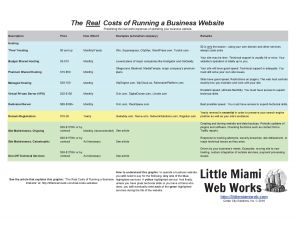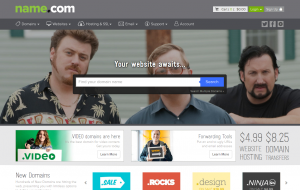 Once you finish paying your website designer a too-large chunk of money for that spiffy new business website, your expenses have not ended. They’ve only just begun.
Once you finish paying your website designer a too-large chunk of money for that spiffy new business website, your expenses have not ended. They’ve only just begun.
But those expenses don’t have to break the bank. Virtually any profitable business, including even the smallest one person startup, can afford to keep a business website running.
We’ll take a look at what expenses are necessary, reasonable, and appropriate for keeping your business website tip-top and representing your business.
Introducing Our Super-Duper “How Much It All Costs” Graphic!
 Here’s an easily understood table of website cost centers. You can use this graphic in your own company to pass around for discussion. You should also refer to this graphic as points are brought up in the article.
Here’s an easily understood table of website cost centers. You can use this graphic in your own company to pass around for discussion. You should also refer to this graphic as points are brought up in the article.
If you’d like a portable and easily-viewed version of this graphic, please download it from this link:
Feel free to share this PDF file (as downloaded from our site) for sharing with your partners, or by email or social media.
The Big Picture of Website Expenses
Let’s use the analogy of owning an automobile to represent the concept of keeping your website operating well. Owning a website is very much like owning a car, in certain respects. Like a car, a website has certain responsibilities of ownership:
- Regularly-occurring nominal expenses that you must pay, as the cost of using the car (website.)
- Occasional maintenance that you may pay for or do yourself, as a responsibility of owning the car (website.)
- Intermittent, expert services, at relatively high hourly rates, paid to an auto repair shop, in order to repair unpredictable issues that may arise with your car. (website)
One Key Principle: “Yah Feel Lucky?”
Here’s a key principle to keep in mind about technology in general, not just websites.
The less money you spend on technological services, the more self-reliant you’d better be.
We mean that it’s your money and risk potential. You can proudly go it alone on occasional human-provided services. But your site may wind up down more than it’s available.
You can also skip your homeowner’s insurance. After all, what’s the chances of a fire?
Regularly-Occurring Expenses: Hosting and Domain Registration
Your website doesn’t jump onto the internet and display itself to the world. That’s what website hosting and domain registration do for your website.
These are the website services that are like buying gasoline for your car and keeping your plates registered.
Web Hosting Basics: Renting Someone Else’s Computer
Web hosting is an arrangement where you rent space and processing power on someone else’s very reliable computer that has a very fast and reliable internet connection. And that computer constantly displays your website to the entire world, 24×7.

If your computers don’t look like this, don’t even think about DIY hosting.
All web hosts have many clients just like you to fund their businesses, racks of high performance server computers, backup power supplies, very reliable internet connections that support much faster speeds than your home or business internet, and technical staffs that keep everything operating 24 x 365.
The issue is resources. Web hosting is something that you would never want to set up on a home office or a business’s office computer. Why? Read the preceding paragraph again.
Web hosting is a always a paid service. It’s not something web designer is obliged to supply for free (UNLESS, of course, hosting has been negotiated as part of a package.)
Clear enough?
Web Hosting? How Much – How Often? What to Expect?
How much does web hosting cost? You can budget anywhere from $3 to $300+ per website per month for hosting. Most plans are paid monthly from a credit card or debited checking account, and in some cases by check. You almost always get what you pay for.
A few rules of thumb on hosting fees follow:
- Just expect to pay $10-15 per month for good hosting (for most sites.) The good news: Almost any commercial web hosting that costs at least $10 to $15 per month per site will be entirely satisfactory and quite fast for your website. And, some basic technical and administrative help for your web hosting needs should be fairly readily available from the hosting company.
- Managed hosting plans, which we’ll describe next, provide a layer of protection for your website. These plans cost $30/month and up.
- Very high priced hosting (over $100 per month) is generally unnecessary for most business websites. The exceptions are: the site serves very large numbers of visitors such as popular message boards hosted by businesses and non-profit groups. Or, the website provides some e-commerce function (online sales) and you are paying for availability, security and uptime. Lastly, the hosting may be combined with ongoing site maintenance services.
- Avoid heavily promoted, free or ultra cheap hosting (under $5/month). A cheap web host places your website on the same machine with hundreds of other websites, which affects your site’s speed. And technical support at this level is extremely limited.
- Ask your web designer what service they recommend. Your web designer may have a package of services to keep your site hosted on a web host with which they have positive experience.
Domain Registration: Like Car Tags … It’s a License to Be in Operation
Domain Registration and yearly renewal is another recurring expense you will need to bear for your website. Happily, it’s the lowest cost aspect of running a website at $10 to $20 per year, not including any extra services.

Name.com, a great domain company.
Your website’s “dot com” name is your domain. You’ll need to make a small yearly payment to the commercial web domain registrar that holds your domain in your name, for as long as you want to own and use that domain name. What is a domain registrar? It’s a business that makes its revenue from receiving payments from businesses like yours in order to keep your domain name current in a “master list” owned by an organization called ICANN (https://www.icann.org).
GoDaddy.com is the “Super Bowl Famous” example of a domain registrar. There’s many domain companies such as Name.com and Register.com (as examples).
If you fail to pay the domain registration fee in a timely manner, your domain will get canceled. This means that the domain is eventually released back to the world as an “available to be registered” domain name. When that happens, your website won’t be accessible under that name. Even worse, a domain “squatter” – essentially a domain thief – may come along and register your domain name to themselves. This locks up your website domain.
Squatting a domain name is a bit like paying the past-due real estate taxes on someone else’s property in order to take over ownership for yourself.
Domain squatting is not treated as a crime anywhere on earth. And there’s no inexpensive legal process available for small businesses to regain control of their domain name when this happens. Generally the domain name is “ransomed” for hundreds or thousands of dollars by the squatter. Keep your domain registration paid up. Period.
An ongoing site maintenance plan may include on-time renewal of your domain. Ask your provider what they offer.
Technical Services: Site Maintenance and As-Needed Services
This is where you really need a business relationship with someone you can trust who understands website technology inside-out.
Most websites built with commercially available tools will encounter certain issues and needs soon enough:
- You changed something on your website – you tweaked some part of the site appearance – and you want to “get it back.” How do you do that? How do you backtrack if you hate what you did to your site and you want it undone? Do you even know how?
- The web host that you selected is becoming increasingly unreliable and your site is down a lot. So you want to move your site to a better provider. While many web hosts offer to do this for you, it’s still a technical adventure to get everything correct. Do you have the skills to do this?
- Or… when you log in to your website as an administrator to check on things, your website shows that you need to update some components. Do you know what will happen when you do, or if you don’t? Do you know how to update things?
- Your site just “breaks”. The website shows white blank pages. Or is suddenly formatted in a crazy ugly way. Or displays weird characters.
- Or, your site is hacked. An message that is insulting – or even that of a terrorist organization – is plastered on your site, for customers and clients to see.
- Your e-commerce site “breaks”. Some aspect of payments stops working. Customers complain that they can’t check out. Or are billed twice.
- You’d just like someone to ask if you want to know something technical about your site: do you have Google Analytics, and if you do, what’s it saying? What WordPress plugins do we use? Can we have landing pages linked by a new domain name?
Ongoing Site Maintenance
This is a service that will probably offer the highest business value to you. Why? Because it helps to prevent expensive crisis situations.
In automobile terms, ongoing site maintenance is similar to preventative maintenance for your car: oil chan ges, tune-ups, or changing air filters.
ges, tune-ups, or changing air filters.
A nominal payment every month or quarter for this service (generally) will assure that your website is being watched by an expert for any problems, is being backed up regularly, and is being updated with the latest software releases. The reason this service offers the greatest business value is that an issue like a hacking attempt that results in your site being defaced or having other issues can be corrected easily by simply applying the most recent backup of the website.
Without a site maintenance plan, your website is at increased risk of catastrophic problems: hacking, defacement, theft from your online customers, or de-listing by Google’s website index.
Here are some additional details about the benefits of a site maintenance plan. Your web host generally provides some coverage for these types of issues. But with caveats. Most web hosts only keep the last 30 days or preceding month of backups. If you failed to notice a hack of your website and it’s been over a month since it occurred, you may not have a valid backup available to regress back to. Also there’s no one to ask casual questions. Most web hosts aren’t set up to answer specific questions about any one website they host. Lastly, if the web host restores your site using an automated process, they may miss something and it will be up to you to fix it or ask them for help (again, it may involve extra fees.) Managed hosting is a “good enough” solution that can replace a maintenance plan, for many site owners. Managed website hosting – offered by companies such as WpEngine.com and WpCloud.ca (Canadian owned) – provides an aspect of the ongoing site maintenance service. Managed hosting is a reasonable middle ground approach for site operation where you purchase a what amounts to “blanket protection” from site issues. All managed web hosts all have roughly similar onboarding (new customer) procedures. You’ll upload your website to the managed host when you purchase hosting. The web host’s employees (not you) install your website on your behalf. The managed web host creates higher security for sites that it hosts by placing restrictions on site owners. For instance, a managed host will disallow certain WordPress plugins, from a list of “forbidden” plugins that the company feels either represent security risks or which offer no advantage over built in services they provide. A managed host won’t support a “CPanel” style “power user” dashboard. In contrast, budget and mid-priced hosts offer you pretty much total control over your website. And they let you use any plugin.. That freedom places much more responsibility and higher risks of downtime in your hands with most budget and conventional web hosts. Some managed hosts will keep elements of your website such as the WordPress theme and plugins automatically updated. And managed hosts are highly attentive to their own internet firewalls that block traffic from known areas of the world that have reputations for hacking. Simply put, managed web hosts protect and restrict their customers in multiple ways. So managed hosts can pretty well almost guarantee that your website will not go down or be hacked. This compensates for a lack of personalized service. The one element that a managed host does not provide is “as required” site maintenance services at affordable prices with a dedicated consultant that you know on a first name basis. You must put in a service ticket. When they work on your site, you must walk the web host employee through what you would like to have happen. And consulting fees may apply.
If you choose to not have some type of site maintenance plan in effect, you may stay lucky. Or you may need one of the services we’re about to describe next…
Site Maintenance, Catastrophic: Who You Gonna Call?
When the very worst happens, and your site is hacked and you have no backup, or it just breaks, or some key e-commerce function is no longer working, you’ll need to hire an expert. And that expert probably doesn’t work for your web hosting company.
This the catastrophic failure option. In automobile terms: you need a tow truck, and your cell phone doesn’t work, and it’s past midnight, and the rain is freezing on contact.
 Even your “completely local by your intention” website may be hacked by anyone. In March, 2015, the website of the Morlein Lager House in Cincinnati was apparently hacked by ISIS.
Even your “completely local by your intention” website may be hacked by anyone. In March, 2015, the website of the Morlein Lager House in Cincinnati was apparently hacked by ISIS.
Your best bet for initial assistance with a big website issue is the person or company who designed your website. If that service provider can’t handle the challenge or the issue, they may be able to refer you to someone who does know.
Otherwise, you will likely have to look up web consulting businesses, and ask for a quote for service. Their rates will most likely be pegged to the top end of the hourly price range: $150/hr or more. Freelancers working on their own as a moonlighting activity charge anywhere from $30 to $120 per hour, depending upon their self-confidence, their actual skills, how much volume of business they have, and the nature of the issue. A consultant being brought in with no prior relationship with you will probably want to charge you for an hour or two simply to assess the nature of the problem.
The reason that a hacked site may be no big deal when you have a maintenance plan in force is that your provider can just restore the most recent backup of your website which will be at minimal effort and cost. If you don’t have a maintenance plan in force, you will either have to accept a very dated restored version of your website or you’ll have to pay for expert help to rebuild your website.
One-Off Technical Services
This is the “non emergency” case of as-necessary support. In automobile terms, this is like reupholstering your seats, getting your car detailed, or even replacing the engine or transmission for performance reasons. You’re having some work done on your own schedule and timing, in order to make your life better.
The process for finding a suitable professional to perform the task, and the rates and quotes that you can expect, will be similar to the emergency service situation. The main difference is that you can shop around a little and compare terms without feeling under high self-imposed pressure.
Examples of such website services would be: moving your website to a different hosting company; adding some e-commerce or mailing list or inbound marketing feature to your site.
One Last Note About Technical Services
Know your provider. Word of mouth recommendations (not just affiliation with large social groups like a Chamber of Commerce) and accounts of a provider from your trusted business colleagues, should count for the highest trust.
You get what you pay for, within extremely large “margins of error”. Some inexpensive providers provide excellent quality and value. Some very prestigious, locally well-known, and expensive web service firms will rip you off blindly, or bill you for every tiny event.
Conclusion: Putting it All Together
If you own a website that is important to your business, here’s what you’ll need to spend:
- Web hosting: $10+ per month.
- Domain registration/renewal: up to $20 per year.
- Monthly Maintenance (highly recommended): the equivalent of 1 to 2 hours of consultant time per month. $30 to $200 per month.
- Total: expect to spend approximately $40 to $200 or more per month, depending upon your needs, the hosting, and the level of technical support.
- Some maintenance providers may bundle their services and offer a single price for periodic backups and updates, hosting, and/or domain renewal. It doesn’t hurt to ask.

